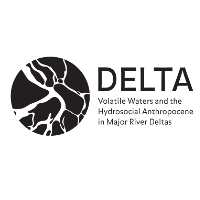Workshop III: Ethnographic Writing, March 27- 29, 2019
How do we write about transforming, metamorphic worlds? How could a deltaic ethnography look like?
From March 27 - 29, 2019 we held an inspiring workshop on ethnographic writing in Namur, Belgium. A couple of months before, we had all returned from our extended period of fieldwork in the four river deltas and subsequently we have started writing up our findings.
The aim of this workshop thus was to discuss our first pieces of writing with three invited experienced researchers and writers: Stuart McLean (University of Minnesota), Jessica Smartt Gullion (Texas Women’s University) and Ben Campbell (Durham University). During the three days, we discussed and reflected among others on ways of writing about transforming, metamorphic worlds, flows, rhythms, connectivity and other-than-human presences and relations. The venue on the Spartivento boat on the Meuse was equally exciting and couldn’t have been better suited for our discussions as we were "on the water" with both our thoughts and bodies. We organized the workshop in four different modules: inputs from our guests, group discussions of our pieces of writing, an open space for thinking, writing and digesting the previously discussed and individual tutorial sessions for in-depth discussions between guests and doctoral students.
We started off with an inspiring input by Stuart McLean. He proposed poetry as a way of writing on places of encounter and transformation such as river deltas. Poetry, he suggested, allows the opening up of channels into metamorphic realities and various temporalities, including other-than-human temporalities. If the linearity of academic prose is often flattening, poetry brings back to the reader a sense of uneven shapes as the sounds, pauses, rhythms and shapes of words remind us the materiality of language itself.
Jessica Gullion shared with us her thoughts on the writer’s vulnerability. Questions on one’s legitimacy and ability to write on others - whether humans or non-humans – often block us during the writing process, lead to the inability to finish our writings or simply scare us to write. In her talk, Gullion encouraged us to turn around this situation, that is, to reframe vulnerability as a strength. If we learn to be comfortable with our own vulnerability positive aspects of it can emerge, for instance being vulnerable and authentic in our writings can create affective connections with the reader.
Ben Campbell suggested that the concept of ‘moral ecology’ could be helpful to speak and write ethnographically about the non-human environment. Moral ecology, he pointed out, goes beyond the idea of ecologies being merely technical. It therefore allows thinking outside of western concepts of ‘nature’ and addressing the crucial questions of ethics, responsibility and reciprocity of multispecies conviviality.
In the different discussions – be it the group discussions or the more individual ones – many interesting elements came up. The following thoughts summarize some of the main ideas that repeatedly emerged in the discussions and reflections:
Language is often – especially in academic writings - overall used to describe, give information and speak about worlds, in a way that maintains the language itself outside the world it describes. This leads to a distancing of our writings from the experience of the world we write about. Michael Taussig calls this "agribusiness writing" in his essay The Corn-Wolf: Writing Apotropaic Texts (2010): “agribusiness writing” is a mode of production (see Marx) that conceals the means of production, assuming writing as information to be set aside from writing that has poetry, humor, luck, sarcasm, leg pulling, the art of the storyteller, and subject becoming object. It assumes writing to be a communicative means, not a source of experience for reader and writer alike”. As anthropologists, however, we want to take readers to places, situations and people we have engaged with during our fieldwork. Therefore, we should be careful not to take out the ‘source of experience’ of our writings. The challenge then is to find ways of writing in which language is not external but intrinsic to the world we write about. This also means that through our writings we participate in the ongoing creation of the world, and therefore we must remain attentive to what kinds of stories we tell, whose sides we take implicitly or explicitly, and what we make the purpose of our analyses and arguments. We need to speak from and speak to the lifeworlds of our interlocutors but we also need to speak from our own positionality and experience. As anthropologists, our job is perhaps less to ‘debunk’ our research partners’ certainties and hopes as culturally specific constructions; rather our job might be to find ways of writing about - and in the spirit of - these hopes and certainties in ways that sheds critical light on what we ourselves take for granted. In this way, we might contribute towards creating a slightly more de-colonial world.
So, in our writings about deltas, we thus have to find a language that is informative, evocative, self-reflexive, capturing and convincing without discarding the sensory, the sounds, shapes, smells and rhythms, the diverse materialities and temporalities of the delta that give our writing a kind of "soul". For instance, we could experiment with a ‘deltaic writing style’. An ethnographic writing style that does not progress linearly, that emerges from the fluctuations, the transformations and dissolutions, the excesses and uncertainties, the movements of water, sand, sediments and fish swarms, the overlaying of past, present and future, the delta dweller’s improvisations and opportunistic strategies.
